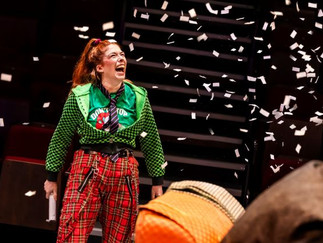A Christmas Carol
- Robert Beale

- Nov 22, 2025
- 3 min read
Kate Ferguson and Susannah Pearce, after Charles Dickens
Octagon Theatre Company production
Octagon Theatre Bolton
November 13, 2025-January 10, 2026: 2 hrs 5 mins


This is not the first stage version of Charles Dickens’ seasonal morality tale by any means, but for doing a lot with slender resources it just about tops the Christmas hamper.
It’s a musical version (like The Muppet Christmas Carol), though the actors have only to sing, not play instruments in the Watermill Theatre style; it’s well suited for both children (age five and over) and adults, with a bit of slapstick, some crazy dance moves and a handful of one-liners, if you like to spot the laughs, and it needs just five performers.
That’s right: five adult actors take all the roles, and there are some quick costume changes and a little sleight of hand in retelling the story to achieve it. Actually, there are also some key roles for children (the young Scrooge’s schoolmates, the Fezziwig and Cratchit children, and the silent, hooded Ghost of Christmas Future) which are taken by members of the Octagon’s Young Company – three teams, of which of course I saw only one: I’m sure they’re all equally good.
Though Scrooge, Marley, Fred the nephew, Bob Cratchit and his family are all Victorian Londoners as you might expect, and the setting by Hannah Wolfe (using the whole auditorium, as we’re in the round) evokes dimly-lit windows and old-fashioned lanterns, there’s a clever bit of time-warping in Sarah Tipple’s production to recreate the story in terms today’s youngsters may appreciate; a pretty wild Fezziwig party (with audience participation), for instance, and a scooter-riding Ghost of Christmas Present (Lucy Keirl) who is very much of the present day. Hannah Brown is both Fan (Scrooge’s saintly sister, who died young) and the Ghost of Christmas Past (and Mrs Cratchit later), and the two merge in this telling. Lucy Keirl is also the charity collector (renamed Mrs Merrybreeches) in the opening scene and Belle, the girl whom young Scrooge loved and lost.
William Donaldson does a great job with both Marley’s ghost (a pretty scary entrance) and Bob Cratchit, and Conor Neaves is Fred, Mr Fezziwig and – like all of them – a variety of bit-characters.
But the central character is Ebenezer Scrooge, and in David Birrell the Octagon welcomes back a great character actor, complete with his powerful pair of lungs and ever-so-slightly creepy knack of casting a jaundiced eye on those he doesn’t like much… until the end, of course, when he likes everyone.
The original story has been supplemented a bit. Sarah Tipple admits she loves The Muppet Christmas Carol, and takes its cue of a double Marley (remember “We’re Marley and Marley”?) one step further to give us, at one point, three of them. We also meet Marley as Scrooge’s employer, along with Belle telling us how he bankrupted the Fezziwig business, in flashback. By the end, the message of the story is well rubbed in, complete with modern-style coloured lights around the room, getting as close as we can (and I applaud this) to pointing out that it’s Christian morality we’re talking about.
One word to the wise: the definition of “humbug” – a word Scrooge uses a lot to condemn the joys of Christmas – given in the script is “fraud… imposter”, as we often use it today. In the 19th Century, it meant much more what we would now call “hype” or “publicity”. PT Barnum came to Britain (including Manchester) in the 1850s with a presentation on The Benefits of Humbug. And he knew a thing or two about that.
More info and tickets here









